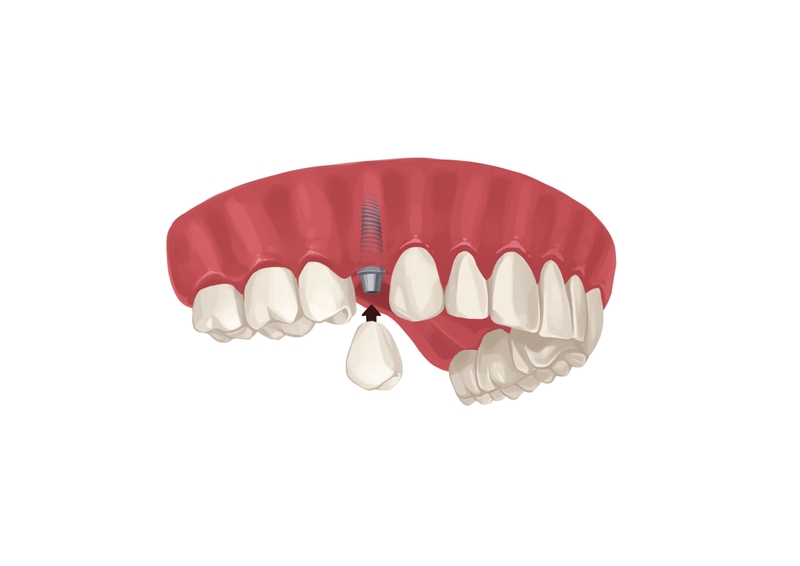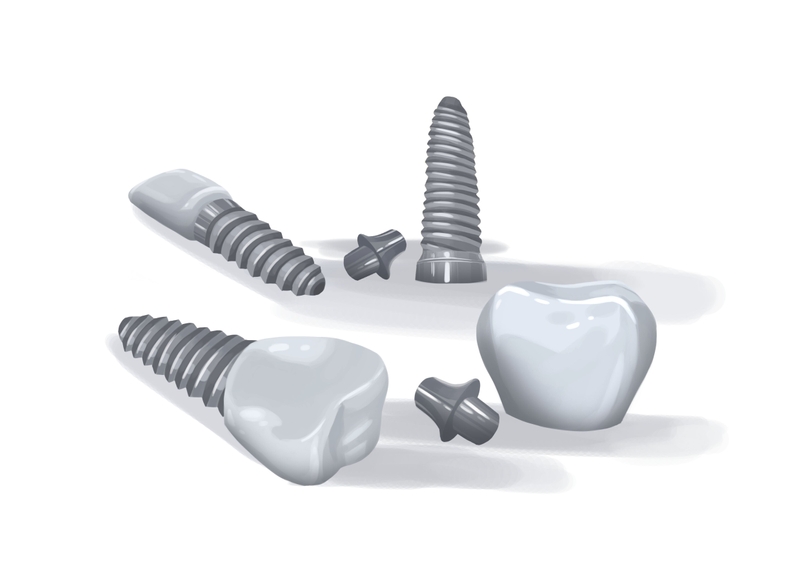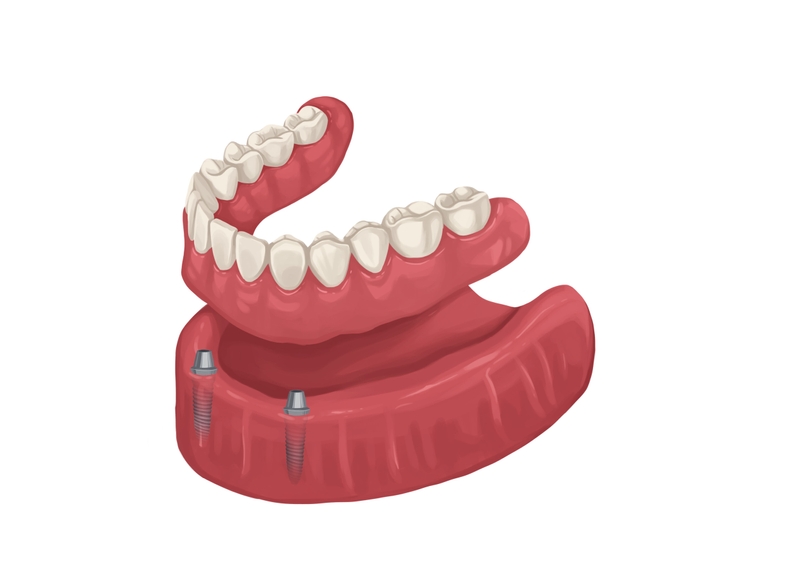- You can use a dental credit card for dental implants. However, most providers require a very good credit score.
- Dental loans are unsecured personal loans. Home Equity Loans and Lines of Credit (HELOC) offer better terms than personal loans.
- Dental payment plans can be tailored to the type of work you are having done. You can also use a Flexible Spending Account (FSA).
Don't let the cost of a great smile hold you back. Join over 100,000 patients who trust Authority Dental and find affordable dentists in your city.
Do you need financing for dental implants? Here's everything you need to know.
Dental credit card

Picture by Authority Dental under CC 2.0 license
Harry Lee, DMD, shares his experience: "The conversation about the cost of a dental implant is often one of the biggest hurdles for my dental patients. The number can be jarring, and it is easy to see why someone might even compare it to buying a used car."
"However, that comparison misses some important part of the equation: an implant is not just a product; it is a permanent, medical solution that changes the entire ecosystem of your mouth," he explains.
Many providers are enrolled in a medical credit card program specifically for healthcare. Patients can apply for a medical credit card at the dentist’s office or online. If you choose the latter, make sure your doctor accepts this form of payment beforehand.
You will receive a special dental credit card to be used only for these needs. Medical credit cards are paid off the same way as regular ones.
Most providers require a good or even excellent credit score. Some credit cards are issued only to those over 18, especially when applying online.
Often offer 0% APR during an initial, promotional period
Interest-free credit or preferable terms
Manageable repayment schedules
Deferred interest promotions can get very expensive if you miss the pay-by date
You will likely need a very good credit score
Your dentist’s office needs to accept this form of payment
Some providers have been accused of predatory lending so you must read the fine print carefully
If you find an offer with 0% APR on a medical credit card, it is a good option. Remember, however, that meeting the repayment deadline is critical here.
After a promotional period, medical credit card interest rates are likely to be very steep, higher than with regular credit cards. If you do not manage to pay that off in time, you will take a big hit to your credit score.
Otherwise, use a regular credit card. The interest rates are fixed and will be accepted at every office.
Dental loans
Medical loans are among the most popular dental financing options. They come in the form of unsecured personal loans. They are most often orchestrated by a third party and dedicated to healthcare.
Dental loans for implants or dentures can be found online and at local lending institutions. The payoff period is usually 3 years or longer. Only a soft inquiry will likely be made, so your credit score will not be affected at this stage.
There are no strict guidelines as to who can apply. However, if you have bad credit, you may need a co-signer.
Dental finance for bad credit
Soft inquiries don’t affect your credit score
You can often receive the money the day you’re approved
High interest rates
Rates can rise steeply after an initial period
Analyzing fine print is essential
You may have to find someone to co-sign the loan
Dental implant loans are unsecured personal loans. Unsecured means you do not put up collateral, such as valuable items or real estate, as opposed to secured personal loans.

Home Equity Loans and Lines of Credit (HELOC)
A home equity loan or a home equity line of credit (HELOC) puts up your property as collateral. This is a second mortgage.
HELOC means you can borrow the maximum amount of what your property is worth, minus what you owe on your mortgage. Interest rates are typically much better than with other types of loans, around 4%-5%.
The problem is that if your home’s value changes due to the housing market, the rates can change. This could be a good thing, however. You can cash-out refinance if your home has appreciated.
To apply for HELOC, you must be a homeowner with a relatively good credit score. You can set up a meeting with a representative of a lending institution to learn how to pay for dental implants this way.
Better rates than personal loans
Often tax-deductible
Unstable housing market can depreciate the value of your property
You are putting up your house as collateral
Credit score should be at least good
Dental payment plans

Picture by Authority Dental under CC 2.0 license
Many practices offer in-house payment plans to their patients. This financing option allows you to spread the cost of dental implants over a few months. You go in, have your procedure, and pay it off over time.
Dental payment plans can be tailored to the kind of work you are having done, especially if the process, like with dental implants, takes a long time. Since this form of financing is in-house, you can expect beneficial terms. The financing may even be interest-free.
Dental practices determine eligibility for dentistry payment plans. You can find information on their website. Otherwise, your dentist might inform you about payment options when setting up a treatment plan.
Make sure to find a local dentist near you to avoid unnecessary travel costs and enjoy the maximum benefits of your dental plan.
The practice might conduct a soft inquiry into your credit score.
Flexibility
Low or even 0% interest rates
Soft inquiries don’t affect your credit score
You might have to have all work done in one office
You can also look into special offers from your bank or credit union, as many are lowering rates to help people dealing with the financial consequences of the pandemic.
Flexible Spending Account
A Flexible Spending Account is a benefit that comes in a company’s insurance package. You can sign up through your employer. The employee decides how much to deduct from their pay and transfer to that account. It is generally dedicated to healthcare costs.
You can write a check or use a debit card that your insurance provider sends you. The amount that is transferred from your pay is before taxes. This means that you end up keeping more money.
Every policy is different. The best way to learn how you can use FSA funds is to contact your insurance provider. You will typically have a period of time (usually the calendar year) during which funds can be used. If that time elapses, you lose the money for that period.
Money from your FSA must be spent on medically necessary items. If the reason for getting implants is purely cosmetic, this option might not work out.
To apply, patients must be insured and have a Flexible Spending Account through their employment.
Money dedicated to healthcare is tax-free
Tax-deductible
$2,700 per year limit
Dental work must be finished by the end of the year use-it-or lose-it date
Health Saving Account
The most significant difference between FSA and HSA is that the latter allows rollover and transfer between employers. Rollover means the funds remain available to use after the new year. Money from your Health Savings Account can also go with you if you change your place of employment.
Both accounts may be great options for financing dental implants with bad credit. They can only be used for qualified products and services, however. Check with your HR department to see if you can pay for dental implants this way.
Contributions to your HSA account are both pre-tax and tax-deductible, so that you can save twice. It is managed through a financial institution that can issue a debit card. Use it to pay for qualified expenses directly at your dentist’s office.
Not everyone is eligible for an HSA. The requirement is a high deductible health plan, meaning $1,350 or more. Anyone, however, the employee or the employer, can set up such an account. You do not have to rely on your work offering this as an option, as long as you have a qualifying medical insurance plan.
Tax-free
Tax-deductible
$3,500 per year limit
Retirement savings

Picture by Authority Dental under CC 2.0 license
Several 401(k) and 403(b) plans offer patients “hardship withdrawals” or loans. These are to be used on medical bills. No credit score check is required, as you are essentially borrowing from yourself.
Typical plans allow you to borrow up to 50% of what is in your savings. This, however, cannot exceed $50,000. Repayment can take up to 5 years.
To avoid double taxation and an additional 10% tax, the out-of-pocket medical expenses have to be higher than 10% of your adjusted income.
Candidates must have a retirement plan through their employer.
No credit check
Low origination fees
Low interest
Interest is accumulated in your own retirement account
You are using your retirement fund
If your employment is terminated, you must pay the loan off in 60 days
Repayment is taxed which means you pay double the tax for the money you borrow
You may not be able to contribute to your retirement savings until you repay the loan
Family loan
Dental implants' finance options also include private solutions.
Family and friends can be excellent sources of loans. There are many benefits to this solution, for example, the flexibility. However, you have to be ready for your relationship with the lender to change. Some people are not comfortable borrowing money from even the most trusted friends or relatives.
You can draft a contract in private or negotiate verbally. It all depends on how close you are with the person who is willing to give you money.
Often no interest
Very flexible terms
No credit check necessary
Can complicate relationships
Fundraising
Online fundraising is now simpler than ever. Popular sites include GoFundMe and FundLy. Those platforms may charge a percentage fee. You can also ask your friends and family to contribute to your implant budget instead of giving you birthday or holiday presents.
To set up an online registry, you can use one of the links above or research other platforms that offer such services. You will likely not need to provide more than your name, email address, and a PayPal or bank account number. Some sites allow you to sign up with Facebook.
There are no special requirements to try fundraising.
No credit check
You don’t need to return the money
No interest
Some might find online fundraising embarrassing or kitschy
Dental implant grants
The state usually funds federal and government grants for dental implants or a similar procedure. They are generally not meant for individuals. The direct proceeds go to universities, state agencies, and non-profit organizations.
If you find any implant grant marked as for individuals, be careful to avoid fraud. You can contact us, and we will help you verify its legitimacy.
According to our research, the following dental grant programs are likely a scam:
Cosmetic Dentistry Grants,
Harris Dental Grants,
Dental Grants of Texas,
Dental Grants of Canada.
We do not recommend any of these. We have attempted to contact these organizations many times. Any information requests were ignored. What is more, none of our dental reviewers has heard about any of these.
Based on our research, we have grounds to assume that the primary goal of these programs is to gather personal data from potential patients. They may then pass on information to private offices, which target their marketing strategy accordingly.
An array of negative reviews suggests that the proposed prices for implant treatment are inflated. The grant is then used to “pay” for the inflation, making the procedure just as expensive as it would be without their help. The positive comments on their websites are required to receive the grant.
A part of the cost may be covered
Not designed for individuals
There may be conditions you have to fulfill
More research is needed
Frauds and scams are common
Inflated prices

FAQ
What is the best way to finance dental implants?
The best solution might differ from one person to another. In an ideal world, every patient would have the cash. If you do not have it on hand, however, there are other options.
If you can make payments on time, go with a lending institution. They offer solutions like loans and credit cards. You can also take out a second mortgage on your house or borrow from your savings.
What credit score is needed for dental implants?
You do not need to prove your creditworthiness for dental implants themselves. If you want a credit card or a loan, however, lenders will run a thorough check.
Requirements as to your credit score are usually determined individually. The rule of thumb is that it should be at least 600. Of course, the higher, the better.
Can I get dental implants with bad credit?
A bad credit score means you are unlikely to get a loan or qualify for a credit card. However, simply checking will not harm, as most lending institutions make only soft inquiries, and those will not hurt your score.
Another option is using your retirement savings, HSA, or FSA, as this solution does not require a credit check. Otherwise, try fundraising or borrowing money from family and friends.
References
- My lender offered me a Home Equity Line of Credit (HELOC). What is a HELOC?
- Flexible Spending Account (FSA)
- Healthcare Spending: Plenty of Blame to Go Around
- Health Savings Account (HSA)
- Retirees, Create a Plan to Pay for Dental Care
- 401(k) Plans
- 403(b) Plan
- Fundraising platform
- Fundraising Website
- Grant Eligibility
Richard Hattaway, DDS
We often tell patients to plan on paying the amount off 1 month prior to the actual due date to avoid any possibility of additional interest charges.